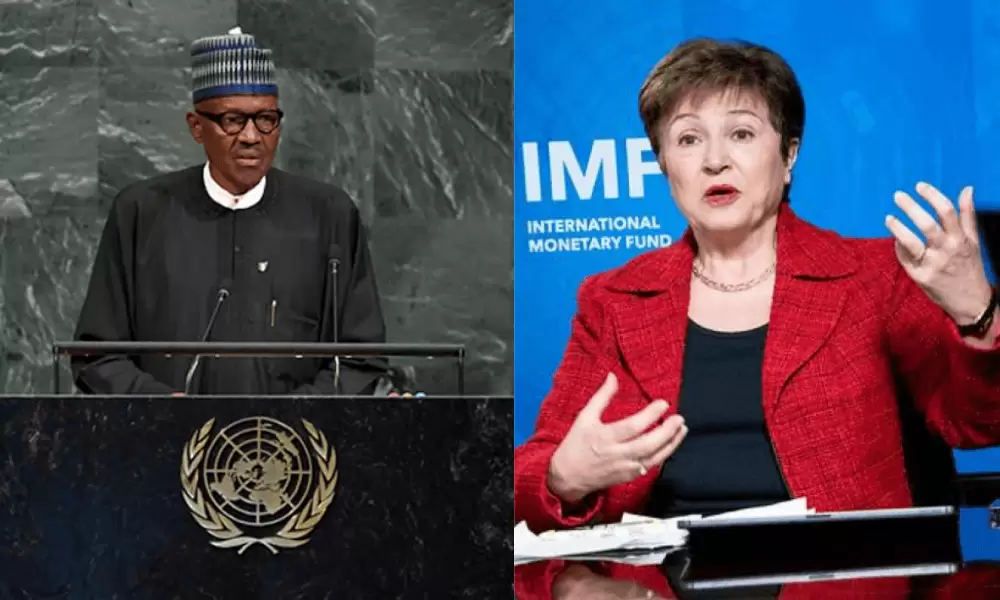The International Monetary Fund has granted debt service relief to 24 low income countries under the Catastrophe Containment and Relief Trust (CCRT).
The beneficiaries have eligible debt falling due in the period through January 10, 2022.
Advertisement
The Executive Board of the IMF, made the approval on October 6, 2021, the multilateral lender revealed on Friday.
The development is coming after President Muhammadu Buhari pleaded at the 76th United Nations General Assembly for a review of the criteria for debt service relief to accommodate countries like Nigeria.
Nigeria spends 73 per cent of its revenues to service debt annually according to official data.
The country’s debt service/GDP ratio of 73 per cent as of August 2021 is the highest among African top economies, according to Zainab Ahmed, Minister of Finance Budget and National Planning.
Advertisement
Buhari had begged UNGA, “On the issue of debt, we have seen that developing countries have been faced with unsustainable debt burdens even before the pandemic. The COVID-19 pandemic has increased the risk of a new wave of deepening debt, where vital public financial resources are allocated to external debt servicing and repayments at the expense of domestic health and financing for critical developmental needs.
“Therefore, there is an urgent need to consider expansion and extension of the Debt Service Suspension Initiative to include all Developing, Least Developed Countries and Small Island Developing States facing fiscal and liquidity challenges. In addition, a review of the eligibility criteria for debt suspension, including outright cancellation, is needed for countries facing the most severe challenges.”
But the only two entrants in the list are Kyrgyz Republic and Lesotho.
IMF said the selected countries “meet the eligibility and qualification requirements for CCRT debt service relief in connection with the COVID-19 pandemic.”
The approval is the fourth trench of debt relieve to low income countries which began in April 2020.
Advertisement
The total debt service relieve granted to the countries is worth SDR 87.9m or $124m.
“This debt service relief helps free up scarce financial resources for vital health, social, and economic support to mitigate the impact of the COVID-19 pandemic. Subject to the availability of sufficient resources in the CCRT, debt service relief for all beneficiary countries could be provided for the remaining period from January 11 to April 13, 2022,” said IMF.
IMF Managing Director, Kristalina Georgieva, in March last year launched a SDR 1bn or $1.4bn in grants for the CCRT.
The fund would help the CCRT to provide financial assistance for relief on debt service for up to a maximum of two years and also the CCRT adequately funded for future needs.
IMF revealed $860m has been raised from donors including European Union, the UK, Japan, Germany, France, the Netherlands, Spain, Switzerland, Norway, Singapore, Greece, China, Mexico, the Philippines, Sweden, Bulgaria, Luxembourg, and Malta.
But the directors said the CCRT would be reviewed in 2022/23, including discussion of CCRT eligibility criteria and funding.
Advertisement
The International Monetary Fund has granted debt service relief to 24 low income countries under the Catastrophe Containment and Relief Trust (CCRT).
The beneficiaries have eligible debt falling due in the period through January 10, 2022.
The Executive Board of the IMF made the approval on October 6, 2021, the multilateral lender revealed on Friday.
The development is coming after President Muhammadu Buhari pleaded at the 76th United Nations General Assembly for a review of the criteria for debt service relief to accommodate countries like Nigeria.
Nigeria spends 73 per cent of its revenues to service debt annually according to official data.
The country’s debt service/GDP ratio of 73 per cent as of August 2021 is the highest among African top economies, according to Zainab Ahmed, Minister of Finance Budget and National Planning.
Buhari had told UNGA, “On the issue of debt, we have seen that developing countries have been faced with unsustainable debt burdens even before the pandemic.
“The COVID-19 pandemic has increased the risk of a new wave of deepening debt, where vital public financial resources are allocated to external debt servicing and repayments at the expense of domestic health and financing for critical developmental needs.
“Therefore, there is an urgent need to consider expansion and extension of the Debt Service Suspension Initiative to include all Developing, Least Developed Countries and Small Island Developing States facing fiscal and liquidity challenges.
“In addition, a review of the eligibility criteria for debt suspension, including outright cancellation, is needed for countries facing the most severe challenges.”
But the only two entrants in the list are Kyrgyz Republic and Lesotho.
IMF said the selected countries “meet the eligibility and qualification requirements for CCRT debt service relief in connection with the COVID-19 pandemic.”
The approval is the fourth tranch of debt relief to low income countries which began in April 2020.
The total debt service relief granted to the countries is worth SDR 87.9m or $124m.
“This debt service relief helps free up scarce financial resources for vital health, social, and economic support to mitigate the impact of the COVID-19 pandemic.
“Subject to the availability of sufficient resources in the CCRT, debt service relief for all beneficiary countries could be provided for the remaining period from January 11 to April 13, 2022,” said IMF.
IMF Managing Director, Kristalina Georgieva, in March last year launched a $1.4bn in grants for the CCRT.
The fund would help the CCRT to provide financial assistance for relief on debt service for up to a maximum of two years.
IMF revealed that $860m has been raised from donors including European Union, the UK, Japan, Germany, France, the Netherlands, Spain, Switzerland, Norway, Singapore, Greece, China, Mexico, the Philippines, Sweden, Bulgaria, Luxembourg, and Malta.
But the directors said the CCRT would be reviewed in 2022/23, including discussion of CCRT eligibility criteria and funding.



